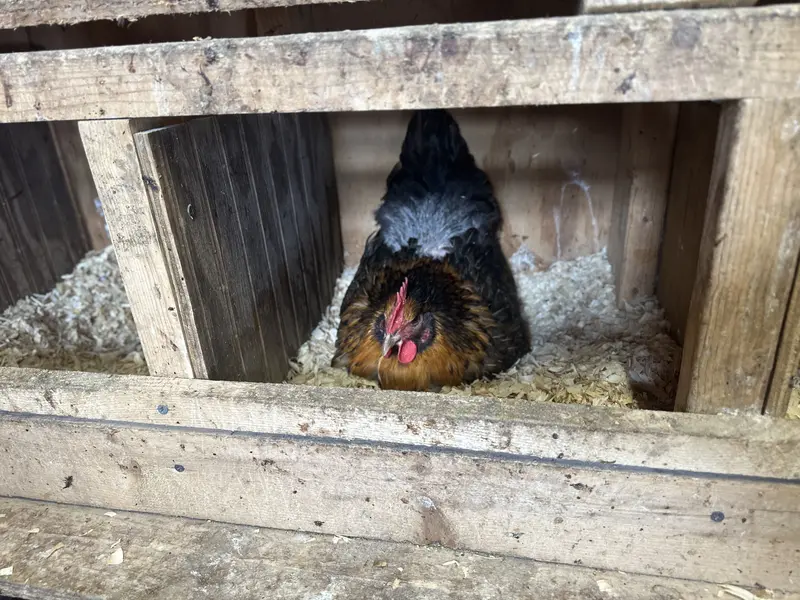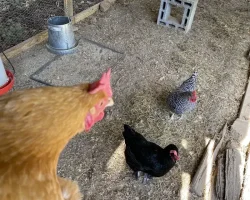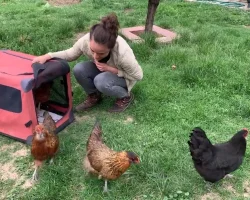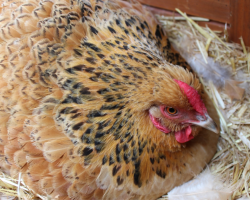Broodiness is the natural behavior in which birds stop laying and sit on eggs to incubate them. If you have a rooster and want your hens to hatch chicks, it’s always exciting when a broody chicken is getting ready to lay eggs. However, sometimes it can be a confusing period for hobbyists who are dealing with broody chickens for the first time.
We want to make sure that everything goes smoothly for our birds. I advise making sure your chicken is as comfortable as possible. Remember, sometimes chickens can be broody without eggs, and this can be even more challenging. In this guide, we’ll look at all the proven ways to handle your broody hens peacefully.
If you don’t have a rooster and like your eggs for breakfast, fast forward to point 7: Breaking Broodiness. Or even better, read more about broodiness and how to prevent it altogether.
1. Feed Your Broody Chicken Properly
Always make sure that your broody hens are eating and drinking properly! First, it will help them to stay physically healthy. But it’s also essential to guarantee the quality of their eggs. It’s an unfortunate reality that most broody chickens won’t eat or drink properly during this period. This may seem counterproductive, but they obsess over sitting on their eggs.
A good nutrient-dense diet will ensure your chickens get everything they need during this draining period. I recommend a standard layer feed with plenty of calcium and protein. These nutrients are absolutely crucial for your chicken’s bone, muscle, and feather health. It’s reasonable to assume that a broody hen isn’t burning much energy because she’s just sitting on a nest all day. But the opposite is true. It’s a really intense experience for the chicken because she’s focusing on keeping the eggs warm. This is exhausting for her muscles and internal energy systems.
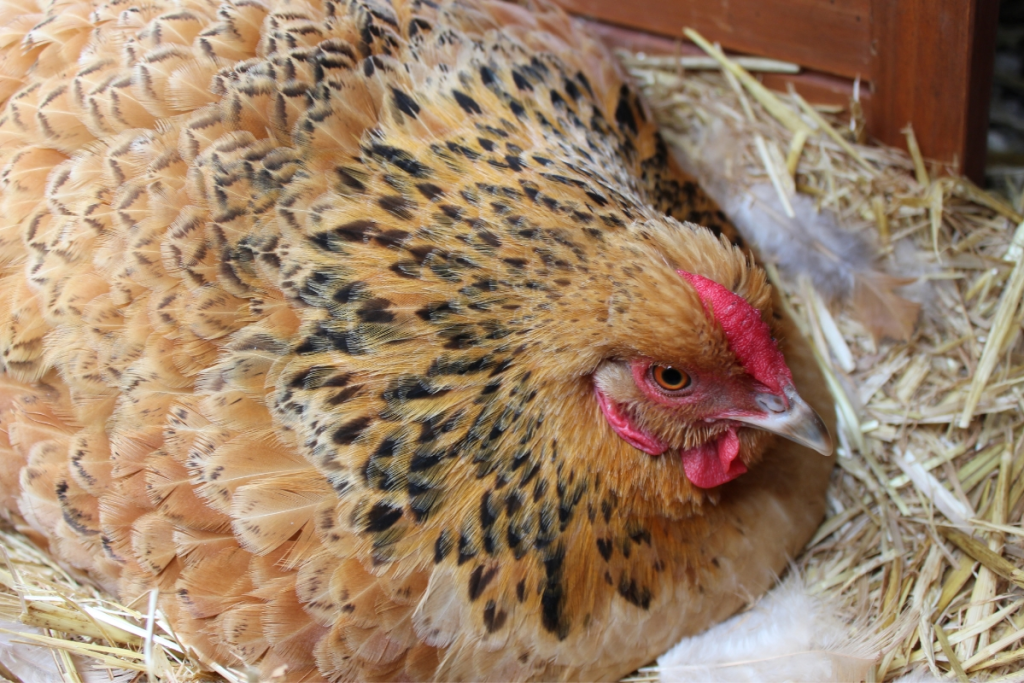
Meanwhile, broody chickens often suffer from feather loss during this period. Protein helps her to regrow feathers as well as general muscle health. You also want to make sure that your birds are getting enough calcium for strong eggshells. If your chicken has a calcium deficiency, it may lay soft-shelled eggs. Remember, provide your hens with high-quality layer feed and extra chicken grit. The hen can also struggle with different health problems, too as seizures and severe fatigue. Finally, ensure your broody birds have plenty of water because they must stay hydrated throughout this stressful period!
2. Move Your Broody Chickens
It’s a fact that broody chickens don’t want to leave their nest. Nothing is more important to them than their eggs. They’d sit there all day if we let them, which can be a problem for their health. Usually, the broody hens will leave their eggs for a few minutes per day to drink and eat. They also need to defecate and shouldn’t hold it in all day! However, some birds won’t do this, so we must encourage them.
You may need to lift your hen off the nest for up to 15 minutes per day if she’s not taking the initiative herself. Exercise caution when doing this because broodiness can cause even the sweetest hen to change personality. It’s common for broody chickens to aggressively peck their owners, so a good pair of gloves may come in handy!
3. Monitor Your Broody Chickens
One of the simplest but most important steps in handling broody chickens is to observe them. This isn’t very complicated, but it’s time-consuming, so you should share duties if possible. Keep an eye on your birds to ensure they’re eating and drinking properly. A broody hen will suffer some weight loss, but it shouldn’t be excessive. Also, they may lose some feathers, but too many is a red flag. You may need to contact your local veterinarian in this situation.
Owners should also make sure that none of the other chickens are harassing broody hens. Chickens have surprisingly complex social structures and can be territorial or hierarchical. It’s not uncommon for them to experience jealousy, and some may even attempt to take over a broody hen’s nest. Sometimes more dominant birds may harass the broody chicken when she leaves her eggs to eat or poop. This isn’t good for her mental or physical health, so it’s important to intervene. It’s even more stressful if several hens become broody at once.
These days, there are even cameras you can use to monitor what’s going on inside your coop!
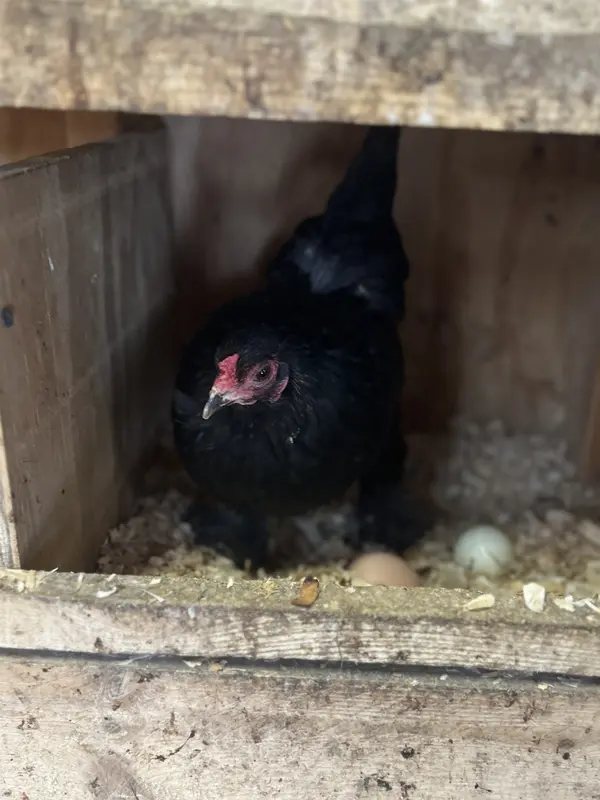
4. Move Her To Another Nest
One of the best ways to handle broodiness in chickens is to move the affected bird to another nest. This will remove the potential issue of other chickens harassing her. She’ll be happier because nothing will bother her. Also, it means that you won’t need to check on her as often because she’s less likely to experience problems.
It’s best to move her and her eggs during the night. Put her in a dark and secluded broody pen or coop so she can peacefully sit on her eggs. This will probably be a smaller space, so ensure you keep it clean. Fresh straw or shavings are a must because you don’t want parasites or mites to gather inside. Remember, your broody chicken will suffer from a depleted immune system during this period.
While you don’t need to observe your chicken so frequently, you should still note her physical condition in case there are severe changes.
The most important aspect to remember is that broody chickens love privacy, so don’t bother them too much!
5. Watch Out For Extreme Weather
Caring for broody chickens is already tricky, but there’s another key factor. Broodiness makes it very difficult for hens to regulate their body temperature. This makes them very vulnerable to extreme weather changes and can be very dangerous for their health. I advise keeping an eye on the weather forecast and taking measures if there’s going to be severe cold or intense heat.
Hot Days Ahead
Broody chickens often suffer from overheating because their body temperature rises when they sit on eggs. This is because they’re trying to incubate the eggs to hatch them. This can be very dangerous in extremely warm conditions because they won’t leave the nest.
Dehydration and heat stress are two of the biggest risks to your bird’s health, so be careful! Move your broody bird to a dark, well-ventilated space. There will be less risk of heat traps, and she will be more comfortable.
Read more here on How To Keep Chickens Cool in Summer.
Winter Worries
Meanwhile, it can also be a problem if your broody hens are too cold. They’ll shiver for warmth, but this uses up even more energy when they’re already draining themselves. Sometimes they may have bald patches because of feather loss. In extreme cases, the bird may suffer hypothermia or even frostbite. Freezing cold can also damage fertilized eggs and prevent them from hatching. Move your chicken to a warmer box with plenty of straw. In more serious cases, it may even be safer to break broodiness.
Discover 9 Top Tips For A Cozy and Safe Winter Chicken Coop.
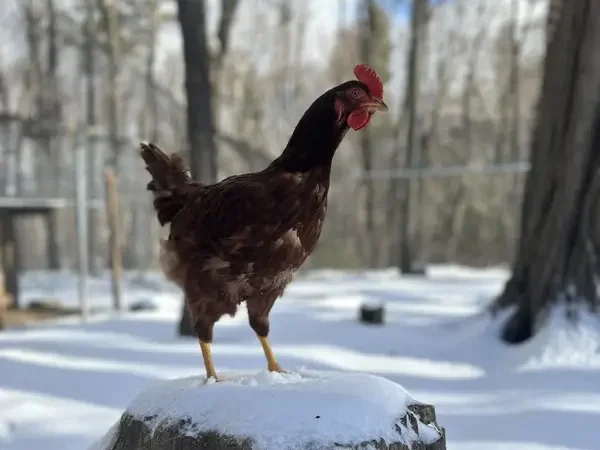
6. Give Your Broody Chickens Treats
One of the best ways to handle broody chickens is to give them the occasional tasty treat. You can do this with hens sitting on eggs or when you want to break broodiness. Mealworms are popular options because they’re full of protein. Sliced fruit or vegetables are also great choices. If your broody chicken is refusing to eat, a tasty treat is a good way to entice them out of their nest. However, don’t give them too many because it may affect their health. Meanwhile, you can also use treats to break broodiness in chickens. It’s a peaceful way to tempt them away from their eggs – real or imaginary – and to distract them. Scatter your chosen treats around an outdoor area if possible, so it distracts them for longer.
Read more here on the Best Chicken Treats.
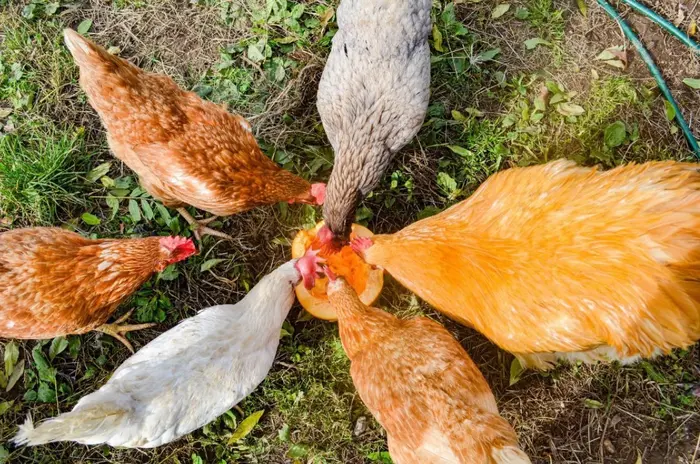
7. Breaking Broodiness
Sometimes a chicken may experience broodiness even when they don’t have eggs. Or, they will try to brood unfertilized eggs (there is no rooster) or even ping pong balls. This is a problem because they still have all the hormones and natural impulses that come with broodiness. Luckily, there are some peaceful and kind ways to handle these broody chickens. The first step you can try is simply waiting. Many of them will give up after about a week. But if she stops eating properly or shows signs of continuing, you will need to intervene. You should remove your chicken constantly from the nest and block access to it.
Another common technique is using a broody breaker cage. In short, this is a cage without warm bedding for insulation. You want to cool her down to help her snap out of it. Don’t use this if it’s too cold outside, but otherwise it’s safe. Ensure there’s plenty of sunlight and activity because broody hens want darkness and solitude. This may seem unkind, but remember she’s not actually sitting on eggs, so you’re helping to keep her safe and healthy.
Final Thoughts
Caring for broody chickens may seem intimidating, but it’s not so challenging with the right preparation. The first time is naturally the most stressful, but from experience, I guarantee you’ll learn quickly. Give your birds the love they deserve, and everything should go smoothly. It’s also important to keep your local vet’s number on standby in case something goes wrong. This is very rare, but it’s better to be safe than sorry! You may need to intervene if your chicken remains broody for too long, so make sure she doesn’t go far beyond the standard 21 days.

